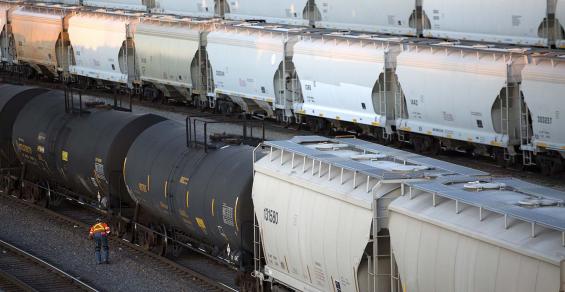More than 200 members of the Agricultural Transportation Working Group today urged Congress in a letter to pass legislation to avert a national rail shutdown. Unions and railroads have until Dec. 9 to avoid a strike, and a negotiated agreement appears unlikely.
The letter to congressional leaders notes that a strike or lockout would hurt the U.S. economy, especially within the agriculture industry. A rail strike would add headaches to an already challenged transportation system.
“We urge Congress to deliver a bipartisan bill to the president’s desk well in advance of Dec. 9 at 12:01 am when a strike or lockout could occur,” the agricultural groups write. “As experienced in September, rail services are anticipated to begin winding down approximately one week in advance of Dec. 9.”
“The nation’s supply chain is at a breaking point, and it cannot take another disruption from a rail strike,” says Alexis Oberg, Deputy Director of the Shippers Coalition. Oberg says coalition members are already struggling to cope with expensive freight rail service, and there’s no end in sight.
The Fertilizer Institute president and CEO Corey Rosenbusch explains ammonia and other fertilizer products will stop moving on rails in preparation for the strike on Sunday, December 4. “With over half of all fertilizer moving by rail year-round, we absolutely cannot afford a rail strike and Congress must act now to ensure that fertilizers and other critical materials and goods that U.S. consumers rely on every day get to where they are needed,” Rosenbusch says.
President Joe Biden issued a statement Monday saying lawmakers should “immediately” codify the agreement he helped broker in September between unions and railroads “without any modifications or delay.” Biden’s statement emphasizes the administration’s concern about the possibility of a rail shutdown.
Congress is set to vote on legislation today that would prevent a rail strike. A letter from House Speaker Nancy Pelosi to Democratic colleagues explains there will be two separate votes. The first vote will be on adopting the tentative labor agreement, and the second will be on a measure to add seven days of paid sick leave for railroaders to the agreement. The Senate is expected to act shortly after.
While the Senate is expected to pass legislation, any single senator could slow the process.
“It is beyond belief that in the year 2022 rail workers in America have zero guaranteed paid sick days,” says Bernie Sanders (I-Vt.). “The rail industry must come to the table and negotiate a contract which treats their workers with respect.
Rail moves 25% percent of all U.S. grain, equivalent to 1.5 million carloads. Rail also moves 1.2 million carloads of grain products, such as flour, soybean oil and meal, dried distillers grains and ethanol. The American Short Line and Regional Railroad Association estimates a rail shutdown could cost the economy $2 billion per day.
Congress is set to vote on legislation today to adopt a tentative agreement, but paid sick time remains a sticking point.




